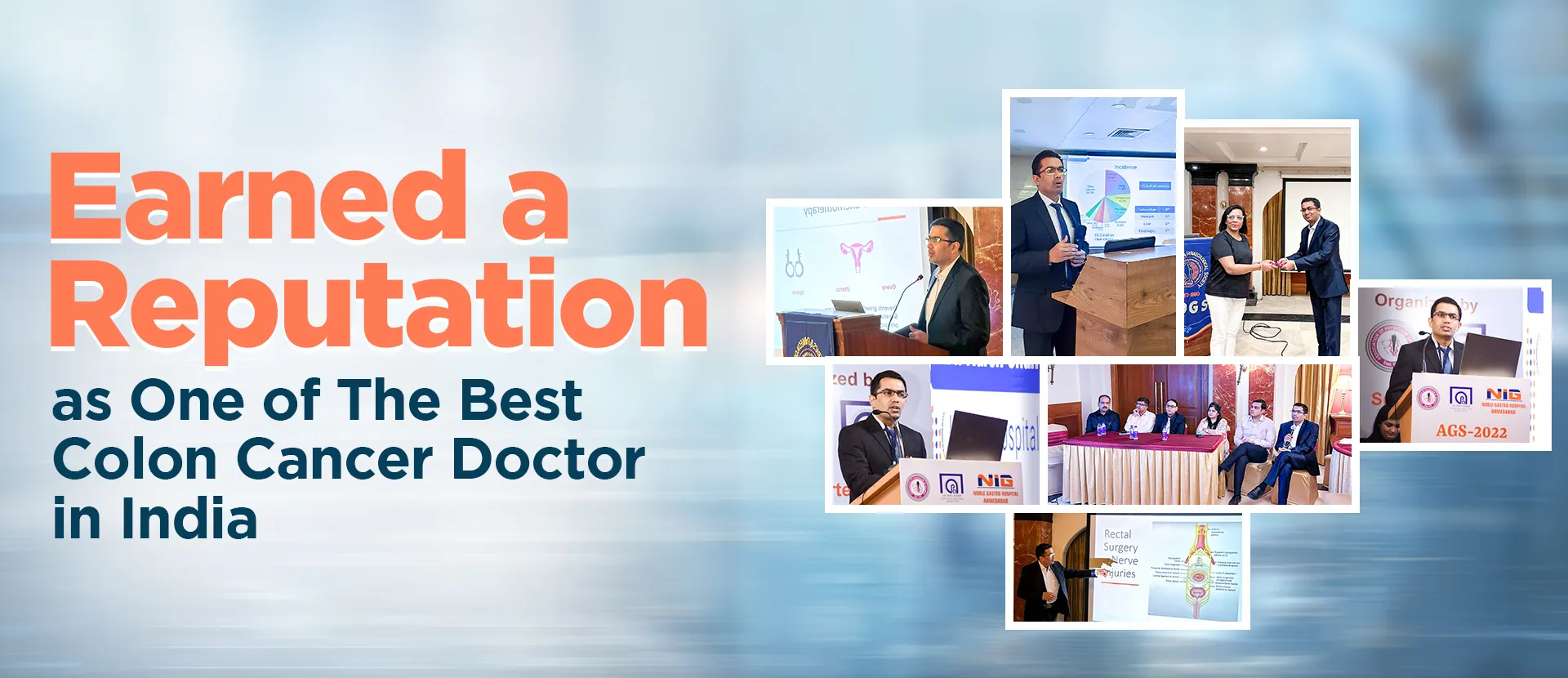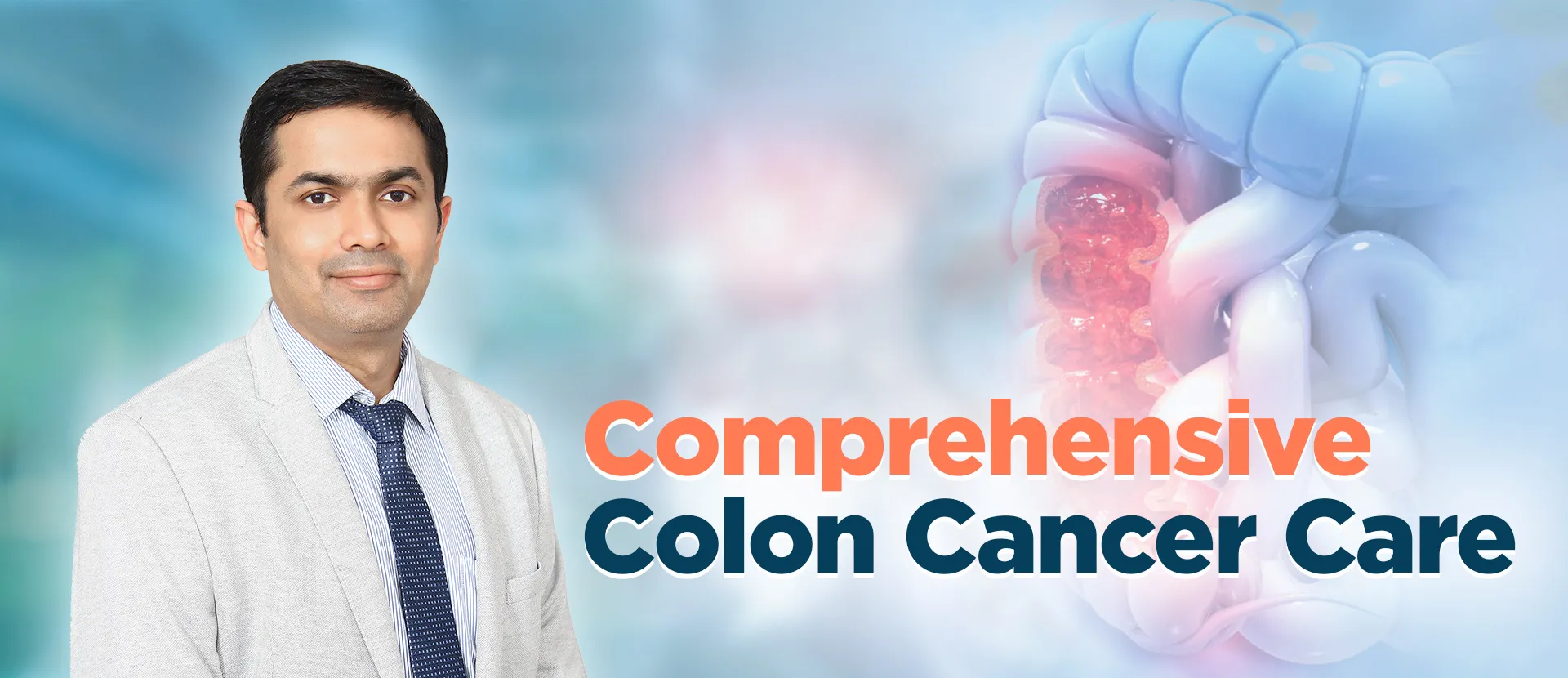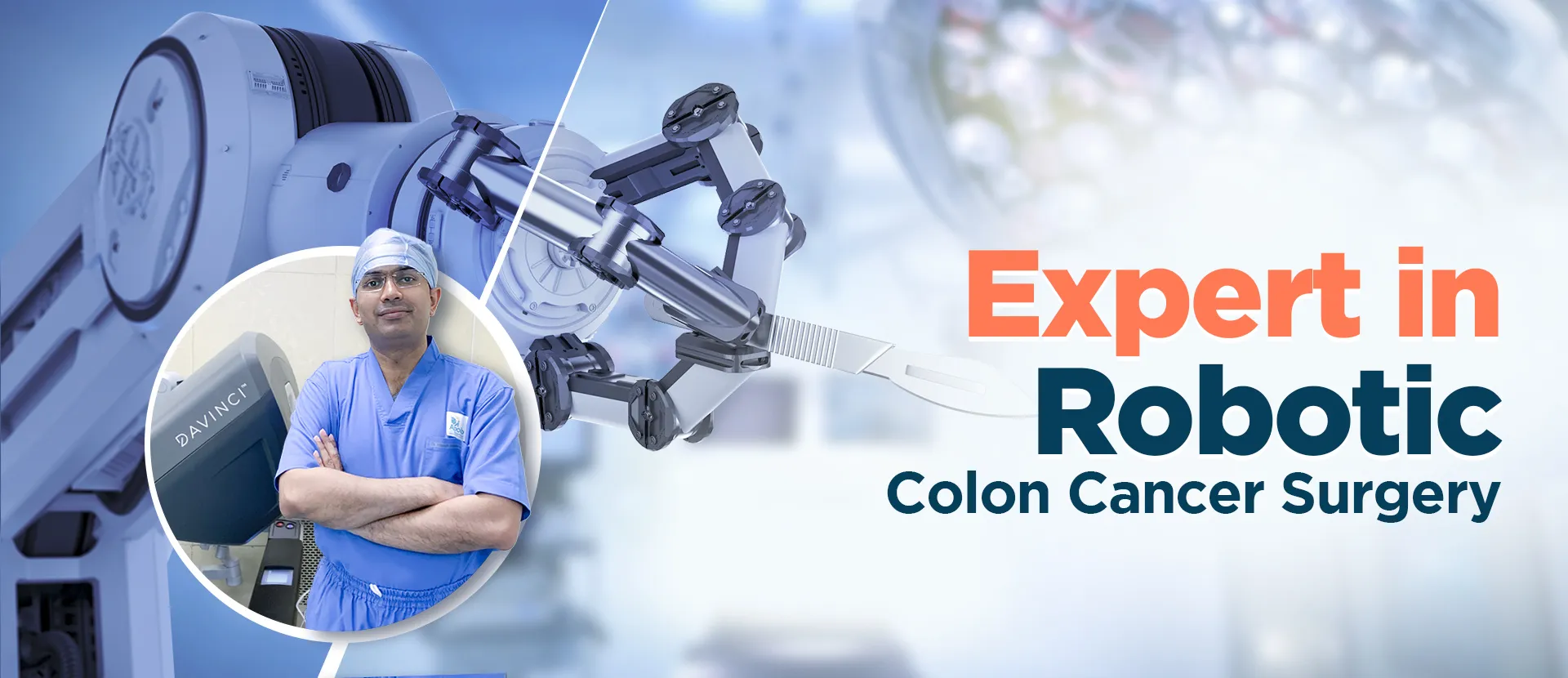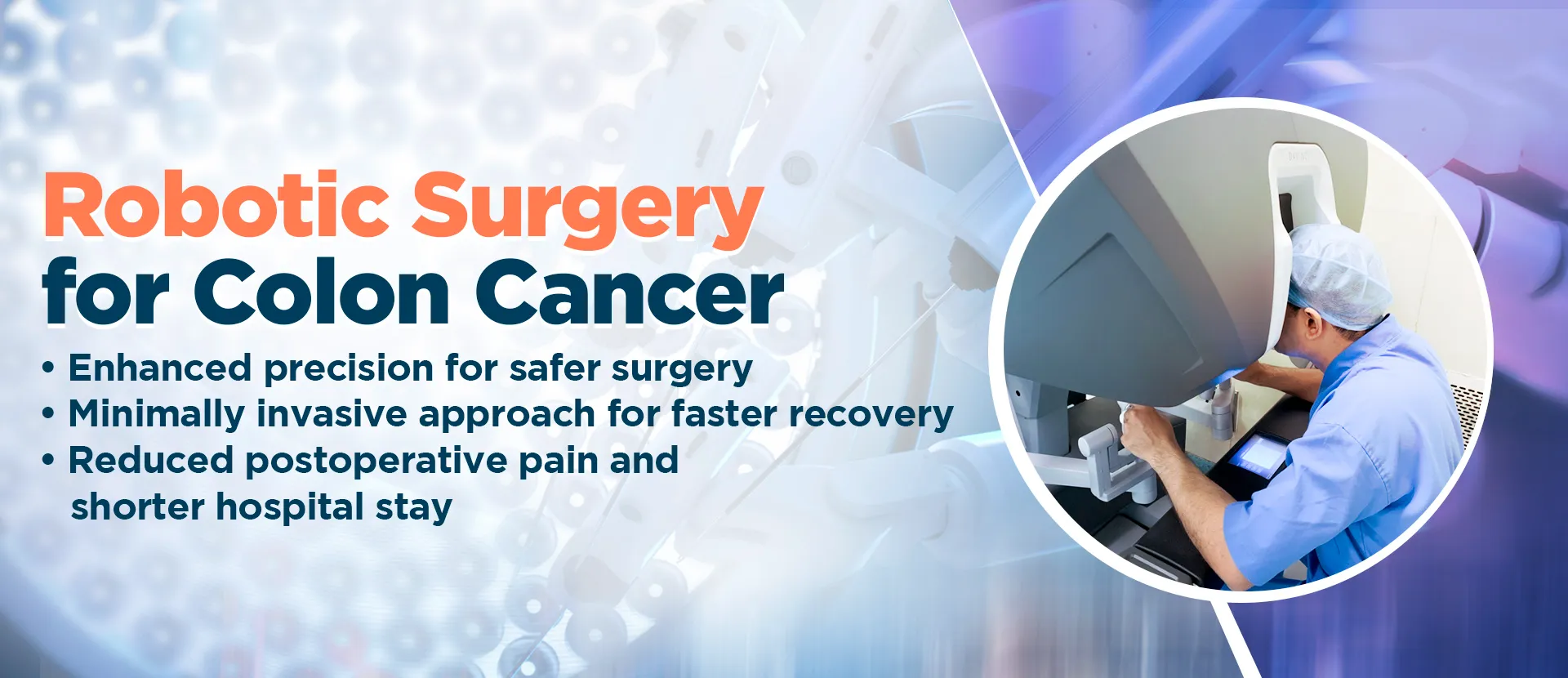
How Microplastics Affect Our Health
Microplastics are tiny pieces of plastic that are everywhere—in the air, water, and food. Scientists reviewed studies to see how they impact our health. They






Maulana Azad Medical College, Delhi, GB Pant Hospital, Delhi

Holds the highest degrees in Oncology – DrNB, MCh

Having 15+ years of experience in treating



11750+ Patients have been successfully
treated

15+ years of work experience

22+ Awards received by Dr. Shah for his achievements
Dr. Harsh Shah is widely acclaimed as a distinguished colon cancer surgeon in Ahmedabad but also throughout the state of Gujarat and across India. His exceptional surgical skills and unwavering attention to detail have consistently led to successful outcomes for numerous patients with colon cancer. Whether performing complex colon resections or utilizing minimally invasive procedures, Dr. Harsh Shah’s expertise in colon cancer treatment remains unparalleled.
For individuals in search of top-quality large intestine cancer treatment in Ahmedabad, Gujarat, or anywhere in India, he specializes in performing colonoscopy procedures for colon cancer detection and diagnosis. Dr. Harsh Shah’s colon cancer hospital stands as a premier destination for colon cancer treatment. The hospital is equipped with state-of-the-art facilities, advanced diagnostic technologies, and a team of highly skilled healthcare professionals who are passionately committed to delivering the highest standard of colon cancer treatment.
Dr. Harsh Shah is an expert in robotic surgery for colon cancer, using the latest advancements in minimally invasive techniques to improve patient outcomes. His skill in performing complex colon cancer surgeries makes him one of the best colorectal surgeons in Ahmedabad. By utilizing cutting-edge technology, he helps patients achieve faster recovery and better survival rates, especially in cases like colon cancer 3rd stage survival rate.
Dr. Shah’s hospital also provides transparent pricing for treatments like colorectal surgery cost in India, ensuring affordability while maintaining top-quality care. His role as a leading surgical oncologist in Ahmedabad ensures that patients receive the best colon cancer treatment possible in their fight against large bowel cancer.
Dr. Harsh Shah’s pioneering advancements in colon cancer surgery, coupled with his expertise in surgical interventions and dedication to compassionate patient care, position him as an exceptional choice for individuals in need of colon cancer treatment. His significant contributions to the field of colon cancer have profoundly impacted numerous lives, establishing him as a prominent colon cancer doctor in Ahmedabad, Gujarat, and across India.
Dr. Harsh Shah’s hospital offers comprehensive colon cancer treatment in India, with a focus on providing the latest therapies. Patients benefit from the most recent advancements, such as colon cancer treatment stage 4 new treatment, which offers hope even in advanced stages of colon cancer. His hospital is renowned for combining surgery, colon cancer medication, and other therapies to provide a complete colon cancer treatment plan.
For individuals wondering colon cancer kya hota hai, Dr. Shah and his team provide clear, easy-to-understand information, ensuring that patients feel well-informed about their colon cancer treatment options. His hospital is known for offering some of the best colorectal cancer treatments in India, including personalized care plans and the latest colon cancer treatment options.
Colon cancer is a cancer that affects the large intestine (also known as the colon). Large intestine has several parts i.e. ascending, transverse, descending, sigmoid. Cancer can happen in any of the parts of the large intestine.


Symptoms of Colon Cancer:
⦿ Persistent change in bowel habits
⦿ Blood in the stool
⦿ Abdominal pain or cramping
⦿ Unexplained weight loss
⦿ Fatigue or weakness
⦿ Iron deficiency anemia
⦿ Narrow stools
⦿ Constipation or diarrhea that lasts for more than a few days
⦿ Feeling that the bowel does not completely empty
⦿ Rectal bleeding or dark-colored stool.
Stages of colon cancer are as follows:
⦿ Stage 0: Cancer is in situ, confined to the innermost layer of the colon.
⦿ Stage I: Cancer has spread to the deeper layers of the colon wall.
⦿ Stage II: Cancer has penetrated through the colon wall and may affect nearby tissues.
⦿ Stage III: Cancer has spread to nearby lymph nodes but not to distant sites.
⦿ Stage IV: Cancer has metastasized to distant organs or tissues.
Staging for colon cancer are as follows:
CT scan: A CT scan, or computed tomography scan, is a non-invasive imaging test that provides detailed cross-sectional images of the body, including the colon. It helps in detecting abnormalities and evaluating the extent of colon cancer.
Treatment options for colon cancer include:
⦿ Surgery: Removal of the cancerous portion of the colon.
⦿ Chemotherapy: Medications to kill cancer cells throughout the body.
⦿ Radiation therapy: High-energy beams to destroy cancer cells.
⦿ Targeted therapy: Drugs that specifically target cancer cells.
⦿ Immunotherapy: Boosting the body’s immune system to fight cancer cells.
⦿ Palliative care: Focuses on symptom management and improving quality of life.
People trust Dr. Harsh Shah with their health when it comes to dealing with colon cancer – His results speak for themselves!
People trust Dr. Harsh Shah with their health when it comes to dealing with colon cancer – His results speak for themselves!
Dr harsh shah is compassionate and confident. He creates trust in patient. I am fortunate to be treated by him. He is a ray of hope. Apollo and it’s patient are lucky to have such a good surgeon .Dr harsh shah is best intestinal cancer specialist doctor. Thank you so much sir.

I had a colon cancer. I was operated by Dr Harsh Shah. Now I am fine. I would like to thank Dr Harsh Shah & entire Apollo family for my treatment. 🙏

We came from Rajasthan and were looking for best colorectal Surgeon in Ahmedabad. We met Dr Harsh and were impressed with his attitude. Robotic surgery was done and we went back home in few days. Thanks to Dr Harsh..




Tap Below to Listen

Tap Below to Listen

The operation theatre is equipped with latest robotic system, HD laparoscopy system, Laser system, Laminar flow – Hepafilter & many more such technologies.
The Hospital also has 50+ bedded ICU with the latest support systems such as ventilators, dialysis machines & a team of best critical care doctors.
Radilogy department is fully equipped with latest CT Scan & MRI machines. The hospital also has an interventional radiology suit.
Dr. Harsh Shah, the best doctor for colon cancer in India, leads a renowned colon cancer hospital in India. Collaborating with a team of experts, including medical oncologists, radiation oncologists, and interventional radiologists, the hospital is recognized as the best hospital for colon cancer surgery in India. Their multidisciplinary approach ensures patients receive the best colon cancer treatment, incorporating the latest advancements in the field.
Dr. Harsh Shah not only focuses on medical expertise but also understands the financial aspect of colon cancer treatment as a top colon cancer doctor. He strives to provide cost-effective solutions, considering the cost of colon cancer treatment in India. He offers dedicated care and support to colon cancer survivors. Through close collaboration with patients, he ensures they receive optimal colon cancer treatment within their financial means.
In addition to established treatments, Dr. Harsh Shah stays updated with new treatment options for colon cancer, offering patients the best possible outcomes. His comprehensive approach and dedication make him a trusted choice for individuals seeking effective colon cancer treatment.
Dr. Harsh Shah leads a team of top oncologists in Ahmedabad to deliver effective colorectal cancer treatment. His team, which includes some of the top 10 oncologists in Gujarat, works collaboratively to provide comprehensive colon cancer treatment. Together, they manage everything from early diagnosis to complex cases requiring colon cancer therapy.
The team’s multidisciplinary approach ensures that patients receive the highest standard of care. Their expertise, combined with Dr. Shah’s reputation as one of the best colorectal surgeons in India, makes his hospital a trusted destination for colon cancer treatment. By working together, the team ensures that every patient receives a personalized colon cancer treatment plan tailored to their specific condition.
Dr. Harsh Shah, an esteemed colon cancer doctor in India, excels in various aspects of cancer care, including the challenging treatment of colon cancer stage 4. His expertise in colon cancer treatment has made him a leader in the field.
What distinguishes Dr. Harsh Shah as the top colon cancer doctor in Ahmedabad is his exceptional success rate in colon cancer treatment. His extensive knowledge and expertise as a colon cancer doctor, specializing in the treatment of colon cancer in India, have yielded remarkable outcomes, even in advanced cases of stage 4 colon cancer treatment. Patients trust Dr. Harsh Shah to provide effective colon cancer treatment options that improve their quality of life.
Dr. Shah specializes in various modalities of colon cancer management, including colon cancer chemotherapy, doing his best as the best colon cancer doctor in Gujarat. His expertise as a colon cancer doctor, combined with his comprehensive approach and commitment to patient care, makes him a trusted choice for individuals seeking large bowel cancer treatment. He provides expert guidance and support for colon cancer recovery after surgery.
Dr. Harsh Shah’s commitment to patient education is evident in his clear explanations about colon cancer treatment options. Patients can trust him to provide information about the colon cancer treatment cost in India, ensuring they have a transparent understanding of the financial aspects of their care. His dedication to staying updated with the latest colon cancer treatment options, such as colon cancer therapy, has earned him the trust of patients from across Gujarat and beyond.
His hospital’s focus on affordability, without compromising on quality, helps patients access the best colon cancer treatment. With his expertise in colon cancer treatment stage 4 and colorectal cancer treatments, Dr. Shah continues to be a leading figure in cancer care.

Explore surgical photographs with caution. Please be advised that viewer discretion is recommended.


When it comes to treating colon cancer, there are several effective options available. The choice of treatment depends on the stage of the cancer and the individual’s overall health. Here are the primary treatment modalities for colon cancer:
Surgery is often the first-line treatment for colon cancer. It involves the removal of the tumor and nearby lymph nodes. The extent of surgery depends on the stage and location of the cancer.
Chemotherapy uses drugs to kill cancer cells or prevent their growth. It can be administered before or after surgery to eliminate any remaining cancer cells or reduce the risk of recurrence.
Radiation therapy utilizes high-energy radiation to destroy cancer cells. It may be used before or after surgery, or in cases where surgery is not possible. Advanced techniques minimize side effects.
Targeted therapies target specific molecules or pathways involved in cancer growth. These medications can be used in combination with chemotherapy and have shown benefits in advanced stages of colon cancer.
Immunotherapy boosts the body’s immune system to fight cancer cells. Immune checkpoint inhibitors have shown promise in treating advanced colon cancer with specific genetic characteristics.
Robotic surgery has revolutionized the treatment of colon cancer, providing minimally invasive options with improved outcomes. Here are the main types of robotic surgeries used for colon cancer treatment


1
Robotic-Assisted Colectomy: Removal of the affected part of the colon using robotic arms and instruments controlled by the surgeon. Offers greater precision, smaller incisions, and faster recovery.
2
Robotic Total Colectomy: Complete removal of the colon using robotic assistance. Useful for extensive colon cancer cases or certain hereditary conditions.
3
Robotic Proctectomy: Removal of the rectum and nearby lymph nodes. Robotic surgery enables enhanced access and precision in the confined pelvic area.
4
Robotic Lymph Node Dissection: Precise removal and examination of lymph nodes to determine the spread of cancer cells. Robotic surgery aids in thorough and accurate lymph node dissections.

Microplastics are tiny pieces of plastic that are everywhere—in the air, water, and food. Scientists reviewed studies to see how they impact our health. They

Eating healthy and staying active can help lower the risk of colorectal cancer (CRC). A new review found that following certain dietary and lifestyle patterns

The relationship between gut bacteria and colorectal cancer (CRC) is becoming clearer. This research reviewed multiple studies to understand how bacteria in the gut, cancer
 OncoBot
OncoBot👋 Hello! How can I help you today?